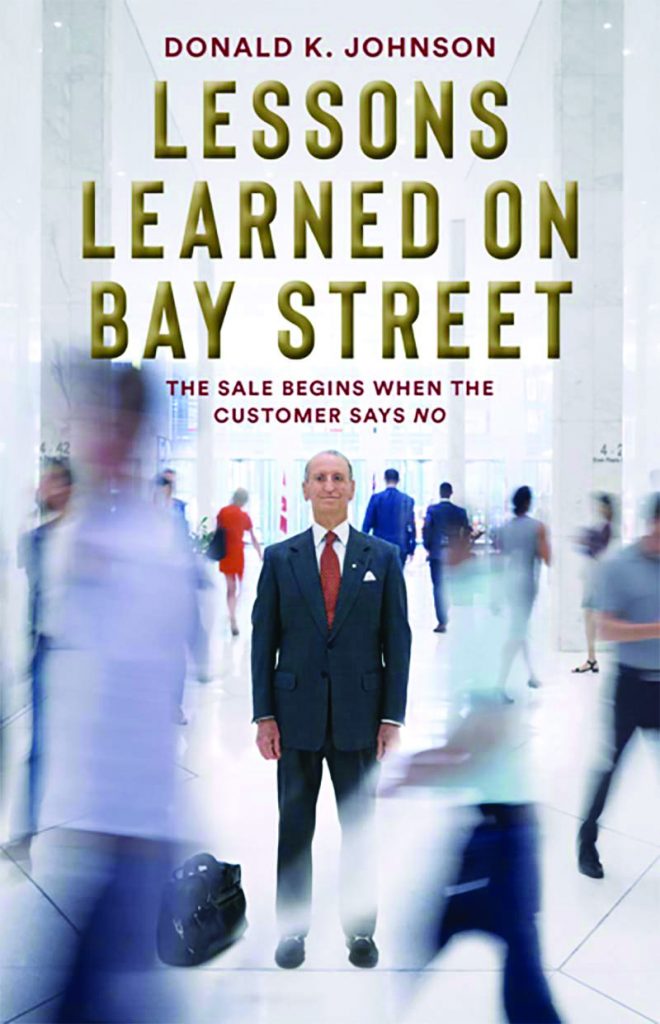A Master Class in Banking and Life

Lessons Learned on Bay Street
Donald K. Johnson
Barlow Books/2021
Review by Paul Deegan
I first met Donald K. Johnson 20 years ago when he was vice-chair of BMO Nesbitt Burns, and I headed government and public relations at BMO. Having read his breezy autobiography, Lessons Learned on Bay Street, I now know him even better. For those looking for a masterclass in how to have a successful career in investment banking, Johnson’s book will not disappoint. For those looking for a master class in life, Johnson will delight.
Johnson takes us on an amazing journey from 1963 when he applied for a job at Burns Bros. and Denton to the present day. Johnson had to go through a psychological screening test to determine if he was suitable for the investment business. The test revealed that his desire to be in a sales position was in the top 1 percent—something that would propel an Icelandic kid from Manitoba’s Interlake Region to the top of investment banking.
Early in his career, Johnson learned the value of hard work, networking, and being quick with a joke. More importantly, he learned that the partnership culture was key to a firm’s success. To Johnson, it came down to placing the best interests of clients first and keeping partners’ interests ahead of personal priorities. How many financial institutions would not have wound up on the ash heap of history if they understood what Johnson knew, even as a young investment banker?
Johnson’s career almost came to an end in the mid-1990s. A few months after Bank of Montreal paid $403 million for Burns Fry, Brian Steck, president of BMO Nesbitt Burns, called Johnson to his office and suggested that Johnson retire. Despite his days being numbered, Johnson continued to work full throttle and he concluded a $1.1 billion deal for Suncor. Clearly impressed, Steck then decided that it was premature for Johnson to retire. That was a wise call, as Johnson brought in the biggest deal of his career a couple years later with British American Tobacco exchanging its 42 percent interest in Imasco for 100 per cent of Imperial Tobacco. BMO earned tens of millions of dollars in advisory fees for the transaction.
One key to Johnson’s success has been personal relationships. He has 6,100 names in his list of contacts and one of those names is Warren Buffett, whom he persuaded to invest in struggling Home Capital. Perhaps an even more important relationship was his friendship with John Whitehead, who was co-chairman of Goldman Sachs. Whitehead shared how he divided his time: one-third for management, one-third for corporate and government clients, and one-third as a volunteer board member for charitable organizations. Whitehead stressed that his volunteer work allowed him to meet senior executives, some of whom became Goldman clients.
This struck a chord with Johnson, whose eyes were so bad that his colleagues nicknamed him ‘Boggles’ for his Coke-bottle glasses, so he became involved with fundraising for eye research. In 2007, he donated $5 million, followed up with another $10 million in 2015, to fund the Donald K. Johnson Eye Institute at Toronto Western Hospital. Johnson’s greatest contribution to Canada’s charitable sector has been his 25-year advocacy campaign to change our tax laws to encourage more charitable giving. The persistence of his advocacy is based on his three favourite philosophies:
- The sale begins when the customer says no.
- Persistence prevails when all else fails.
- Never give up. Never give up. Never, never, never give up!
While the book is largely about his life in business and philanthropic circles, he does pull back the curtain—just a little—on his personal life. He notes that as a father, quality time with the kids meant taking them to the car wash or to his office on weekends. He had a long and happy marriage with his beloved Anna, who died last year. He even shares advice on healthy living—right down to eating Bran Buds and the need for a good night’s sleep; Horizontal by Nine is his motto.
Johnson invites the reader into his early years in Lundar. He and his three siblings grew up in a 600 square foot home with no electricity or running water. His mother was adamant that he go to university, so she moved the family to Winnipeg. Her decision changed the trajectory of Johnson’s life, and Canada is better for it. I highly recommend this book for anyone looking for an intimate portrayal of a life that, at 85, continues to be very well lived—one that serves as a model for others.
Contributing Writer Paul Deegan, a former executive with BMO Financial Group and later CN Rail, is CEO of Deegan Public Strategies in Toronto.
